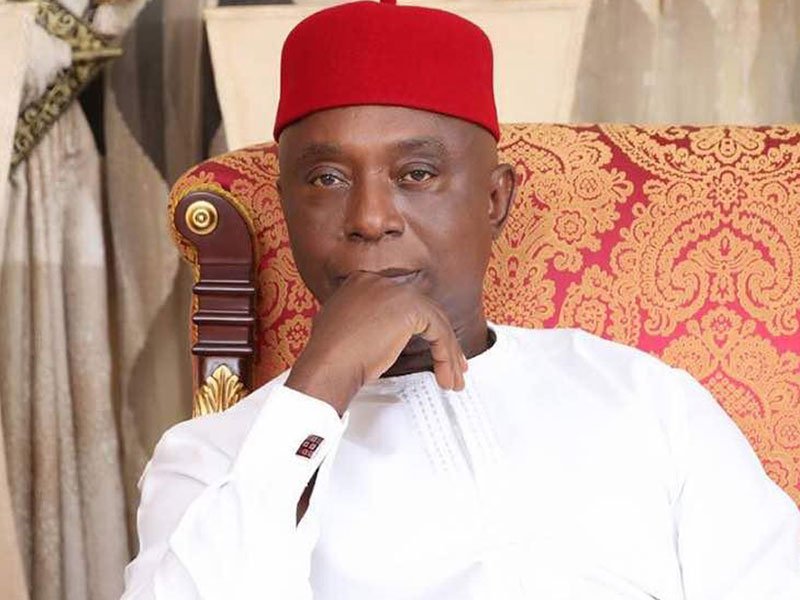...To get all news updates, Join our WhatsApp Group (Click Here)
Also Join our WhatsApp Channel (Click Here)

The family of late Mr. Ugo Henry Nkenchor, has called on the police and other relevant security agencies to expedite action on getting justice for their son, murdered in Udumu-Ugbome by thugs allegedly loyal to Delta State politician, Prince Ned Nwoko, after almost three weeks of assumed inaction.
The deceased, We learnt was allegedly murdered May 7, 2019, over land ownership tussle between Prince Nwoko-owned and proposed Stars University, Udumuje-Ugboko and the Udumu-Ugbome quarter of Onicha Ugbo in Aniocha North Local Government Area of Delta State.
Prince Ned Nwoko is a former member of the Federal House of Representatives, and husband of popular Nollywood young act, Regina Daniels.
The deceased wife, Mrs Dominion Nkenchor, a businesswoman and mother of his five children, in tears has appealed to the government to bring all stakeholders involved in the matter to book.

The deceased, late Ugo Henry Nkenchor
She said, ‘All I want is for the government to help me bring the culprits to justice. It was an untimely death. It was gruesome. He was full of life.”
Ninety-eight-year-old patriarch of Udumu-Ugbome quarters, Diokpa Dennis Nwabuisi, called on the Nigeria Police Force and other law enforcement agents to give requisite attention to solving the puzzle thrown at them by bringing justice to bear on the murder and sundry matters.
“It is over to the government. We want them to take over the matter. It is the duty of the police to take over. They should,” he stated.
According to him, as patriarch of the Idumu-Ugbome quarters, he has not moderated any meeting where discussions of or sales of the farmland in question were held.
In his words, “I am the oldest man in this quarter. This is my eighth year of not going to farm due to eye problem. My youngest brother, I showed him all the lands and boundaries of my farms and he has been farming there. This year, report came to me that some people have cut one side of the bush and sold it.
“That area which Ned is claiming ownership was not sold. It belongs to Idumu-Ugbome. I didn’t sell any land, nor permitted anybody to sell land. I have not signed any deed for anybody.”
A resident of Idumu-Ugbome who begged anonymity, in his synopsis, posited that the management of the proposed Stars University began with clearing and fencing off lands without acquiring. The move was for owners of the land to wail and be settled.
According to him, some miscreants, usurpers and land mongers keyed into the dream. They in full swing planted beacons on lands and approached Nwoko who in his usual carefree manner doled out cash without due diligence as to true ownership.
“That no land sold was accompanied by requisite documentation did not deter the buyer. And this is a communal land. Now many indigenes stand deprived of their farmlands. Many of us farm for a living.
“Now, those who dare to visit are attacked by thugs stationed in the land. Our crops are being destroyed daily and lands fenced off. We thought the news of herdsmen was far off, we didn’t know a catastrophe of such calibre will befall us in our very homes. The height is the murder of our son, Mr. Ugo Nkenchor, ” he stressed.
Recall that both communities were at daggers drawn over the murder of the deceased on that fateful morning of May 7.
An eyewitness account from one Ochei Stephen Nduka who took to his Facebook page confirmed that the people of Onicha Ugbo blocked the road leading to Ugboko (Ned’s community) waiting for innocent Ugboko indigenes who will pass to be killed also as a retaliation.
Nduka made a narrow escape from being killed, as he was going to his village (Ugboko), Nairaland reports. “Not aware of the ugly incident, he was stopped by Onicha Ugbo people and when asked if he’s from Ugboko he said yes; that was how they started hitting him with all sorts of weapons and the motorcycle he was carrying burnt while he was hospitalized,” according to Nairaland.
Meanwhile, billionaire Prince Ned Nwoko described as untrue the allegation that his aides killed a man over land ownership tussle.
Reacting to the allegation, the senator, in a statement by his media team said the report was not a true account of the incident.
He said contrary to the allegation, the land in dispute was never bought by him.
“Prince Ned Nwoko never bought the said piece of land neither are the guys involved his aids and, therefore, should not have been mentioned in this matter. The Stars University’s premises is fenced and the said disputed land is not within the premises.”
Meanwhile, Police Public Relations Officer, Delta State Command, DSP. Onome Onovwakpoyeya, has confirmed the murder but could not ascertain the motive behind it as investigation is ongoing.
She stated, however, that three suspects have been apprehended in relation to the matter.
However, a police source disclosed that one of the suspects was arrested in Nwoko’s premises.
Culled From: The Witness
You can get every of our news as soon as they drop on WhatsApp ...To get all news updates, Join our WhatsApp Group (Click Here)
Also Join our WhatsApp Channel (Click Here)














